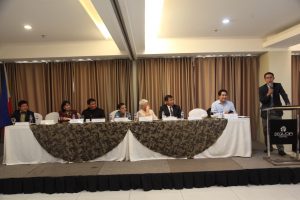DSWD celebrates 25th year of Family Week with back to back fora for Filipino families
News October 2, 2017, 0 Comment 0
Atty. James M. Imbong of the University of Aisa and the Pacific sharing his inputs on the State of the Filipino Family during the Expert’s Forum held on September 28, 2017 in celebration of the 25th National Family Week Celebration. Other resource persons for the forum were: Santaner T. Iray, DrugCheck-Philippines; Remedios Bicomong, YWCA of Quezon City and Co-Author of Magna Carta for Women President; Rev. Larry Faraon, Radio Veritas; Dr. Mary Racelis; Ateneo de Manila University; and Dr. Mina Ramirez, Asian Social Institute; and Colonel Taharudin Ampatuan, MILF Peace Process; and (not in photo) Dr. June Pagaduan Lopez, Philippine Psychiatric Association.
In line with 25 years of observing the National Family Week, the Department of Social Welfare and Development (DSWD) recently hosted an Experts’ Forum and a Malayang Talakayan Situation of the Filipino Family in partnership with the National Committee on the Filipino Family (NCFF).
Conducted on September 28, 2017, some 150 family advocates and focal persons from the government, local government units, and Civil Society Organizations (CSOs) participated in the two fora which both focused on the theme, “Tungo sa Maginhawa, Matatag, and Panatag na Pamilyang Pilipino.”
Experts’ Forum
As Filipino families face new issues, eight practitioners lent their knowledge about the situation being faced by the family based on their experiences.
Dr. June Pagaduan Lopez of the Philippine Psychiatric Association (PPA) shared the effects of mental health issues on families. She said that Filipinos should develop higher sensitivity to mental health as mental health issues can have serious and life-changing effects on families, like the continuous cycle of domestic violence and even incidents of suicide among the young. She said that more studies should be made relative to mental health issues, and their effects on families.
Another expert, Dr. Mina Ramirez of the Asian Social Institute cited some of the effects of economic globalization on families. Among these are the failure of face-to-face communication; the removal of opportunities for real reflection and discussion in families; and inter-generational divides.
“Because of economic and social changes in general society brought about by liberalization and globalization, family bonding is difficult to observe; there are more broken families and emerging alternative families; and there are more incidences of critical illnesses due to unhealthy diets,” Dr. Ramirez added.
For his part, Reverend Father Larry Faraon shared his insights and said that, “The health of the family can always be determined based on the health and emotional and mental condition of the children.”
He said that problems with communication between family members affect the bonds within the family. For instance, children and young adults developed an ‘addiction’ to high technology gadgets. With the addiction to gadgets and digital technology, families are losing control over their children and how they communicate. Children are more distracted, and their attention spans are affected.”
Because of this, he said, parents must exert more effort to be present in the lives of their children and that government and the society must work to wield a stronger and more positive influence on their children.
He added that the Church should also find its relevance in the context of the community and the family. Father Faraon also explained that children today look at religion as optional. Based on their study on why the younger generation are not coming to Church, they look at the Church as an institution and cannot cross and integrate themselves into a religious sphere.
Other speakers were Dr. Mary Racelis of the Ateneo De Manila University; Colonel Taharudin Ampatuan of the MILF Peace Process; Ms. Remedios Bicomong of the YWCA Quezon City; Atty. James Imbong of the University of Asia and the Pacific; and Mr. Santaner Iray of DrugCheck-Philippines.
Malayang Talakayan with family program implementers
In the Malayang Talakayan, family program implementers from the different sectors interacted with three core resource persons, namely: Ms. Excelsa Tongson of the Family Life and Child Development UP Diliman; Dr. Ines Danao of the Society of Filipino Family Therapist; and Ms. Rosemary Alonzo of the Parent Advocates for Visually Impaired Children.
Ms. Tongson discussed the “Context of Care Work of the Sandwich Generation in Low-Income Urban Filipino-Families.” She said that there is a need for an inclusive policy to address issues of urban Filipino families.
On the other hand, Ms. Alonzo shared her family’s experience in taking care of a family member with visual impairment. She stressed that the journey of a family taking care of the well-being of a person with disability is also different and present specific challenges.
Strengthened family programs
2017 is a milestone year in the observance of National Family Week which started in 1992 when President Fidel V. Ramos signed Proclamation No. 60 which declared the last week of September as Family Week.
However, 25 years after, more issues have emerged affecting the Filipino families such as poverty, continuing prevalence of domestic violence, migration, disasters, loss of interpersonal communication, and drug addiction.
Because of these negative developments, advocates of family values and program implementers alike agreed that more should be done to address the issues and ensure that Filipino families are empowered and able to prosper in the new generation. ###